Garden Terrace heralds the start of a new era for UKARIA
South Australia’s privately-run concert hall, in the shadow of Mt Barker Summit, has sympathetically expanded, in a symbol of its growing ambitions and hopes for a return of international performers to its stage.

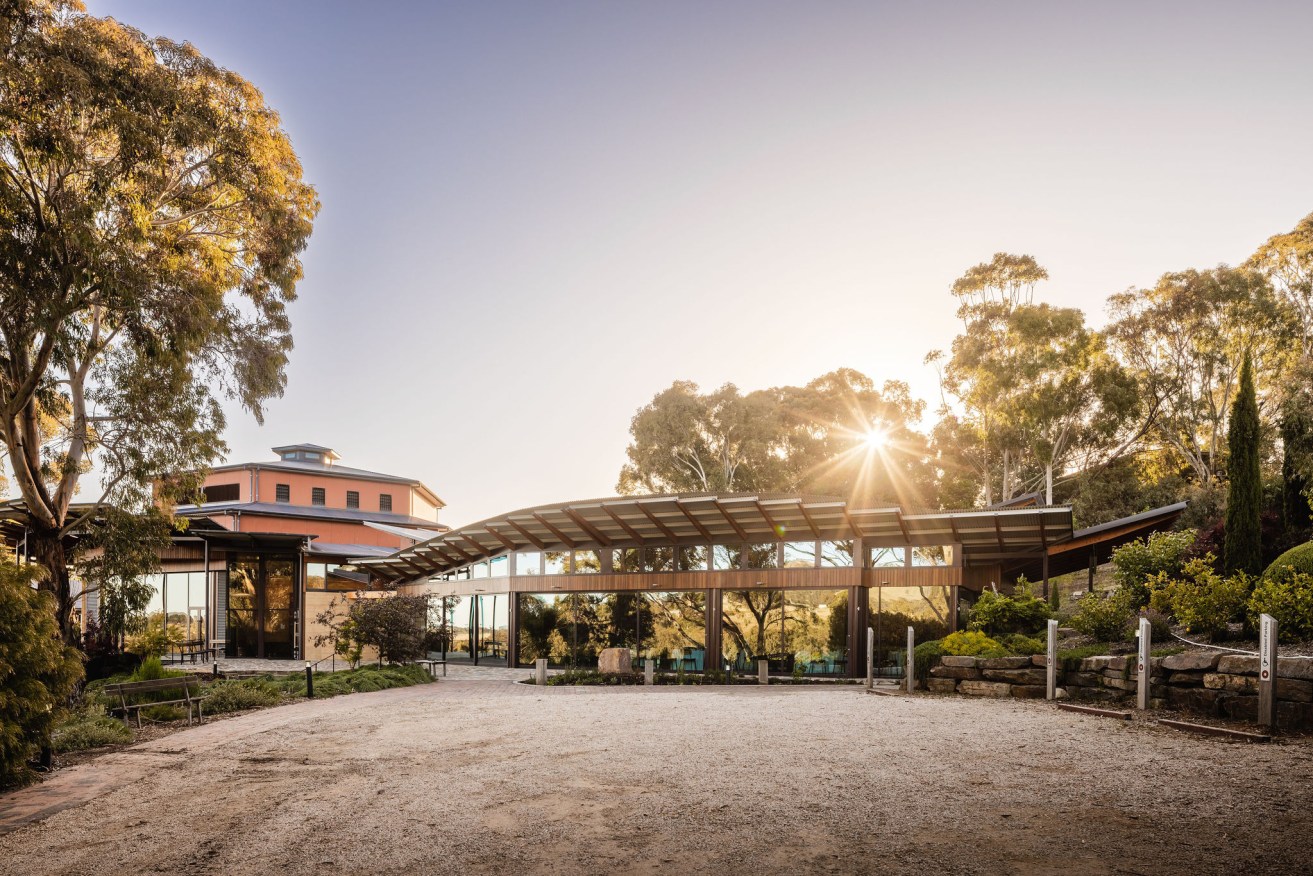
The new Garden Terrace at UKARIA Cultural Centre. Photo: Christopher Morrison
UKARIA Cultural Centre’s pandemic story is much like that of every other arts institution in the state, with a few notable differences.
The concert hall at the foot of Mt Barker Summit has been growing in ambition and scope since it launched into the national and international consciousness in 2015 with the opening of architect Anton Johnson’s spectacular 220-seat building.
The woman behind it all, Ulrike Klein, had been hosting chamber music and other concerts at the site of the Ngeringa herb farm for some time, in a much smaller and more modest building. Its celebrated replacement represented a new take-off point for her cultural aspirations.
In 2015, the program included about 15 concerts. That number exploded to the point that, when it announced its 2020 program in 2019, there were more than 50 events on UKARIA’s calendar.
The pandemic punched a hole in the program but, in a sign of the enthusiasm and loyalty of UKARIA’s audience, most of them clung on to their tickets.
So when Kate Miller-Heidke finally played her concert originally scheduled for 2020 in early November, it was to an audience that first bought their tickets two years ago. Like many of UKARIA’s events, it had sold out in a flash – all the tickets were snapped up in one day, and not even a lengthy pandemic delay would sway the loyal audience.
UKARIA this week released its schedule for February-March next year – more will come, but the pandemic uncertainty rolls on – and when audiences return they will find a transformed space at the foot of the Summit.
Up a dirt track towards the peak, artists will find UKARIA’s “Twin Peaks” accommodation also changed, with a rehearsal room completed during the pandemic-interrupted past year.
At UKARIA, a previous outdoor terrace has been enclosed in a sweep of glass, under the guidance of original architect Johnson. Two huge canvases by South Australian Aboriginal artists sit in the renamed “Garden Terrace” and against the rammed-earth walls of the foyer.
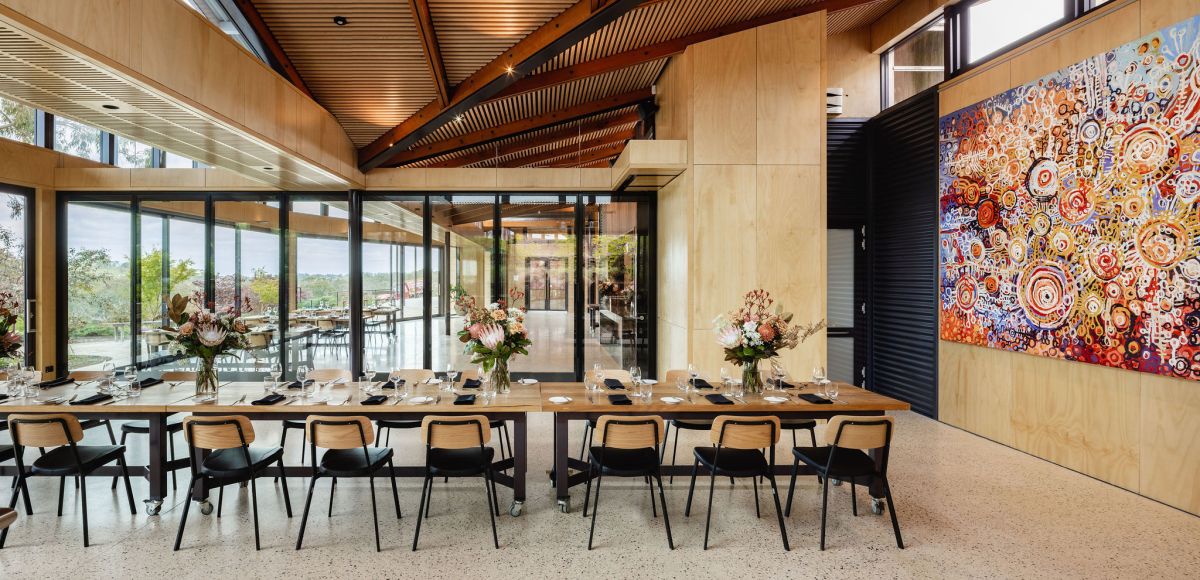
An interior view of the Garden Terrace. Photo: Christopher Morrison
Ulrike Klein and UKARIA CEO Alison Beare both believe the centre is entering a new phase, in terms of the audience experience, but also program growth.
“My vision to build UKARIA has been to connect art and nature, to inspire artists and audiences, a place of creativity,” Klein says. “With the completion of the Garden Terrace my daring dream to create a cultural centre with a concert hall at its heart has been fulfilled. The completion of the Garden Terrace is the beginning of a new era…”
Beare says the new facilities – at UKARIA and Twin Peaks – mean the centre can accommodate artists and audiences in new ways, but it also will see a new phase in programming.
A brief taste of next year’s program shows an eclectic list of performers (details and tickets are available here). These include the quartet of oud virtuoso Joseph Tawadros, who fuses Arabic modes with western classical music, jazz, world, folk, metal and bluegrass. Scottish accordion virtuoso James Crabb will lead a Nuevo Tango quintet in February, while jazz pianist Paul Grabowsky will combine with singer Emma Donovan in a celebration of gospel music.
On the more traditional front, there will be plenty on offer. During the Adelaide Festival, Erin Helyard will curate a long weekend of chamber music, and Katie Noonan will bring her Australian Vocal Ensemble up the Hill. The Australian String Quartet will feature, with ASQ violinist Dale Barltrop and cellist Michael Dahlenburg also joining pianist Andrea Lam for a separate concert. Rounding out the program will be cellist Li-Wei Qin, with pianist Kristian Chong, for an afternoon of Barber, Schubert and Schumann.
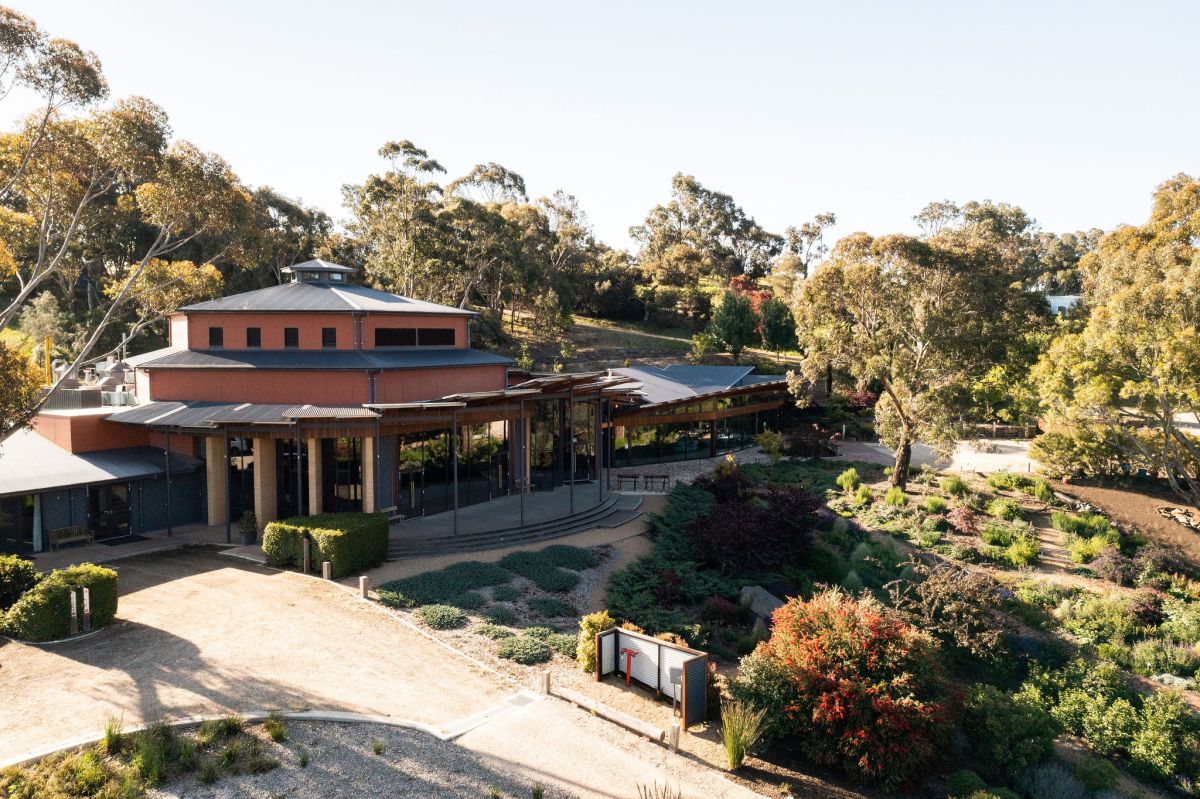
UKARIA Cultural Centre at Mt Barker. Photo: Christopher Morrison
Beare tells InReview that she hopes UKARIA can expand beyond the Australian artists programmed for February-March, with international artists clamouring to return to the Adelaide Hills.
“We have very strong connections with agencies and artists in Europe and the UK, particularly,” she says.
“We had an amazing program lined up for 2020, but it’s been just so heartening to see that they’re all so keen to come. They all understand about COVID delaying things, but we really had put UKARIA on the map internationally in terms of a place that artists want to come.
“Now it’s just a case of reactivating… hardly even reactivating. They’re onto to me to say, ‘When can we come?’.”
For audiences, the new UKARIA experience will be different, with the open bar area enclosed and expanded in a renovation that fits seamlessly with the sinuous contours of the original building.
The Garden Terrace offers a weather-proof place for pre- and post-concert drinks and dining, as well as the opportunity for pre-concert talks and other events, regardless of the temperature and the conditions.
Acoustic treatments will mean that people in the terrace won’t have to shout to be heard, despite the expanses of glass and polished terrazzo floors.
“We decided (originally) to put a lot of work into the acoustics in the main hall – that’s why it’s world-class,” Beare says. “We decided we would put the same level of detail into the Garden Terrace in terms of acoustics. So there’s a timber-slatted ceiling throughout the space and all this acoustic treatment behind it. It reduces all of the reverb – if you like, it’s the reverse of the concert hall.
“So you have this incredibly acoustic experience in the concert hall where you’re hearing music in the optimum acoustical setting. And then when you come out to dinner, with all those hard surfaces, glass, polished concrete floor, you can hear the person opposite you and beside you without having to shout. So that is about investing in the experience.”
Visitors will also enjoy two huge new commissioned works of art – one in the terrace by artist Margaret Richards, called Kapi Tjukula, and the other in the foyer, Seven Sisters, by the Mitakiki Women’s Collaborative of Mona Mitakiki Shepherd, Naomi Kantjuriny and Tjimpayi Presley.
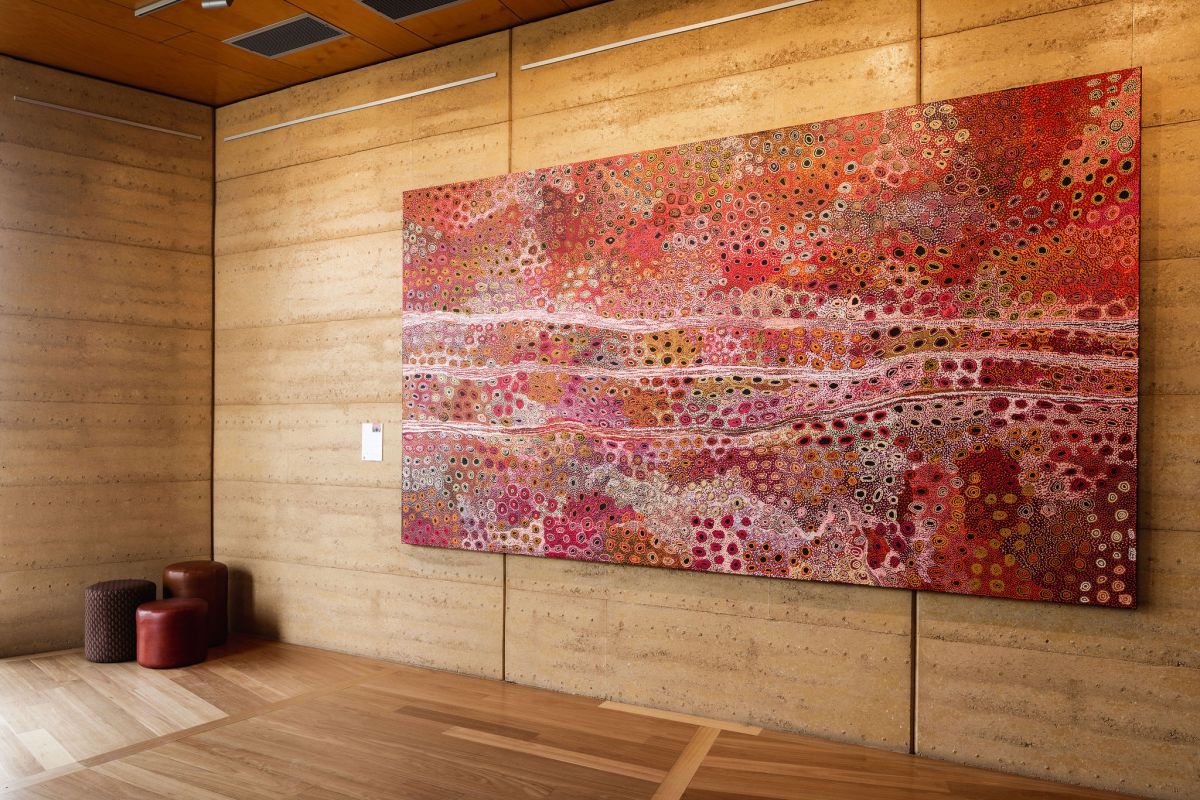
Seven Sisters, by the Mitakiki Women’s Collaborative, hangs in the UKARIA foyer. Photo: Christopher Morrison
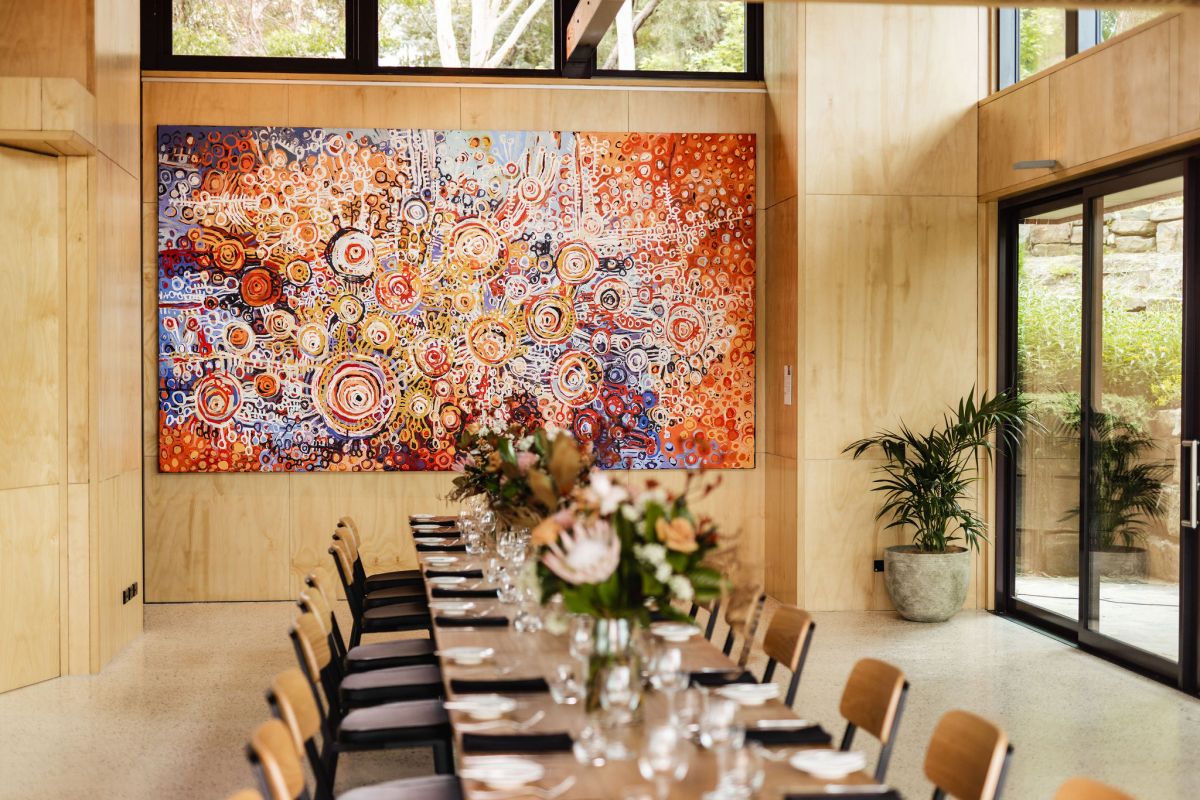
Kapi Tjukula, by Margaret Richards, fitted perfectly in the Garden Terrace – but not without some adjustments to the space. Photo: Christopher Morrison
Beare says that the pandemic ended a long history of UKARIA showing borrowed Indigenous works from the Art Gallery of SA. As a replacement, new works were commissioned from the APY Gallery. The original plan was to choose one from two works to hang in the foyer: but when Klein and Beare saw the completed canvases, they couldn’t choose.
The only problem was where to hang the second 4.2m-wide work. The Mitakiki painting was perfect for the foyer, but where to hang Richards’ work?
“Ulrike says to me, ‘So Alison, we have to get both and I need a wall – we just have to find a wall’.”
Beare took a tape measure to the nearly completed Garden Terrace and found a wall where it would just barely fit – with only a few centimetres each side. Architect Johnson was called to the site and, while he agreed it would fit, he asked Beare to take a step back.
“And I took a step back. And there’s a massive column, like, in the middle of the artwork. If you’re looking at the artwork from anywhere else, you would have seen this column in the middle of it. So I said to Anton, ‘We need to get rid of the column’.
“So literally, the building was nearly finished. And the floor was in – that terrazzo polished concrete floor. We chopped off the column, we added a huge beam and reclad the wall in that hoop pine, and all around it. It looks stunning. You’d never know we didn’t plan it.
“But if you go up there, have a look – because there’s a little perfectly round piece of new concrete floor where the beam was.”
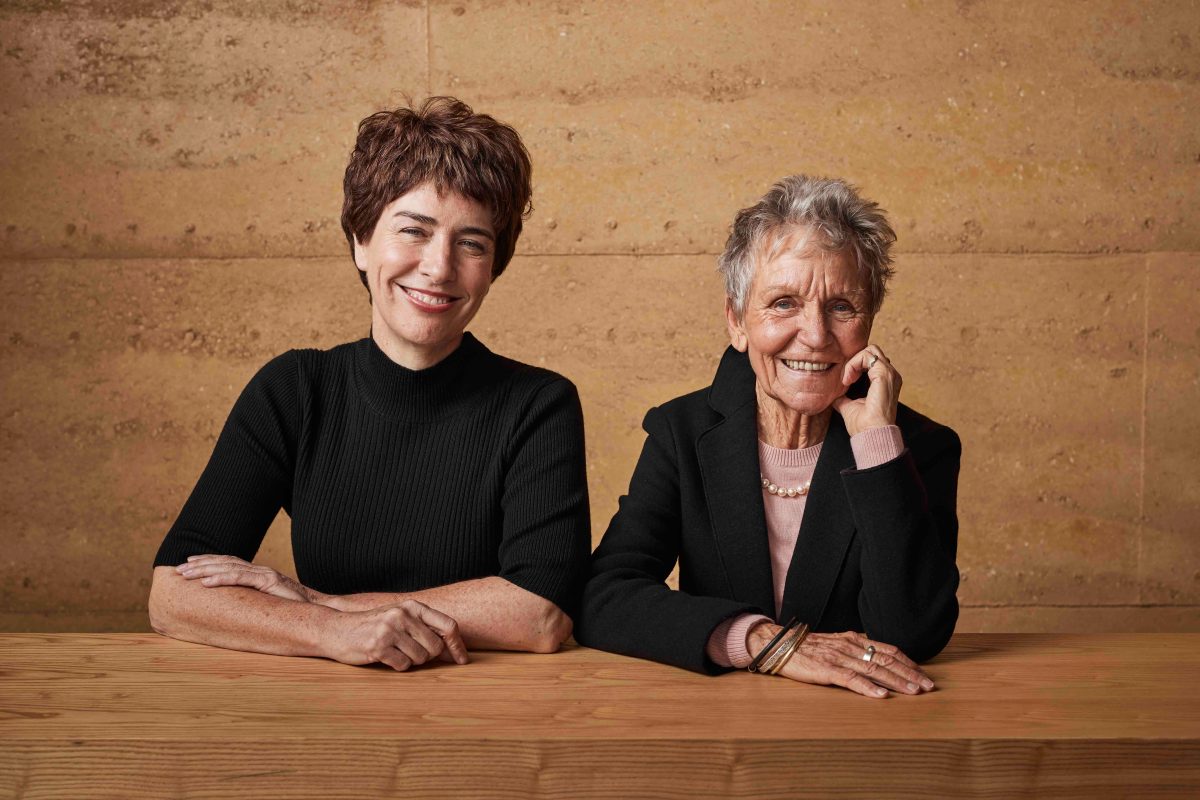
Alison Beare and Ulrike Klein at UKARIA. Photo: Randy Larcombe
It’s the kind of detail that makes UKARIA a special place – and the kind of story that only happens with the backing of someone with the uncompromising vision of Ulrike Klein.
“It’s not a fluke that Ulrike has created a globally successful skincare company out of Mount Barker (her former company Jurlique), from nothing – from a kitchen table. And then, in a way, she’s done it a second time, with UKARIA…
“There’s something in her that is utterly unique: she has this ability to see very big, very broad and very far with not much certainty underneath it. It’s a huge privilege to work with her.”




